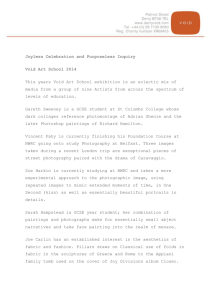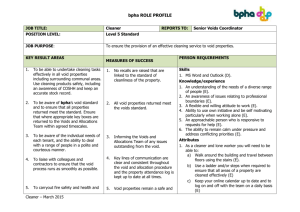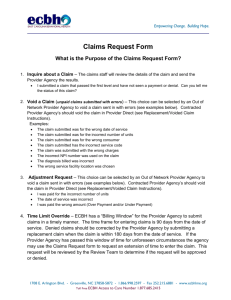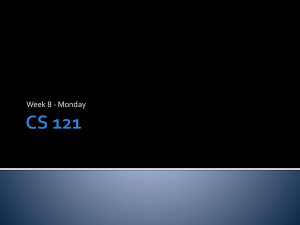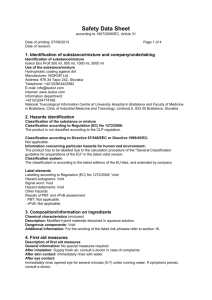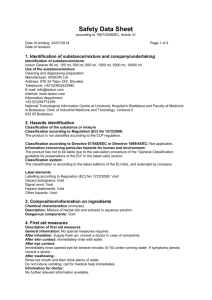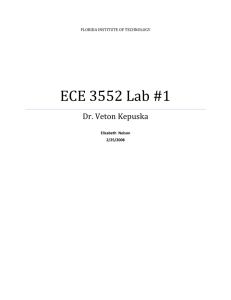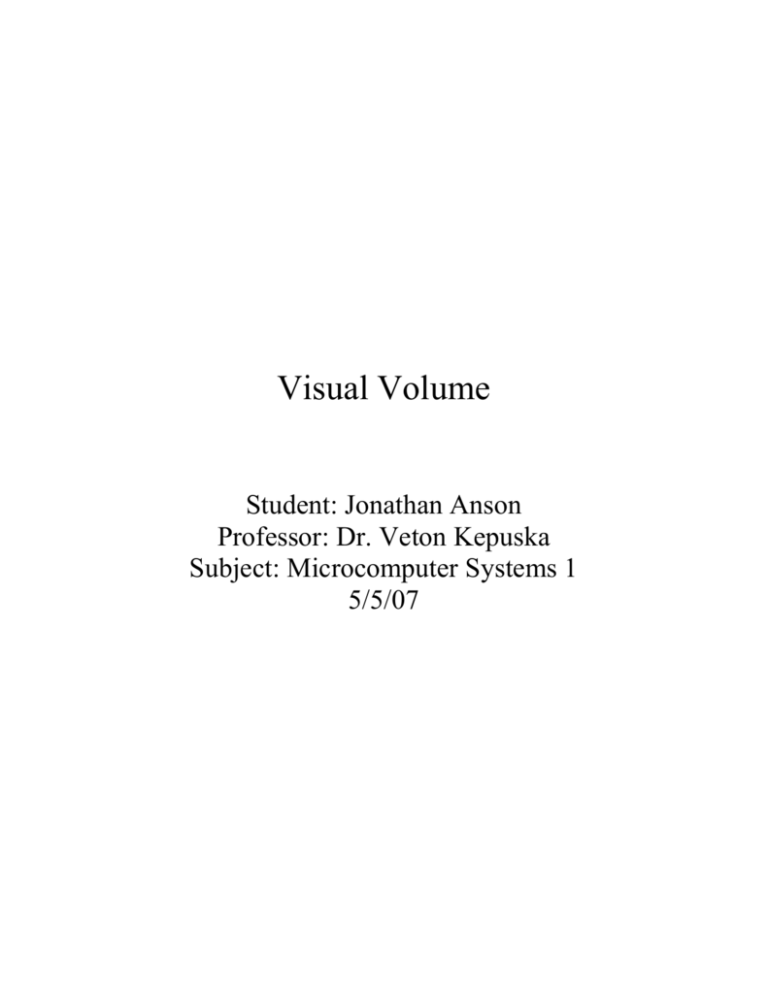
Visual Volume
Student: Jonathan Anson
Professor: Dr. Veton Kepuska
Subject: Microcomputer Systems 1
5/5/07
Purpose: To use the ADSP-BF533 EZ-Kit Lite to adjust the volume of an incoming
signal. To manipulate the incoming signal to produce a desired special effect
Features: There are 6 levels of volume and the LED display will adjust according to the
level of the volume. A special echo effect is also produced at the push of a button.
How to use program: Play any audio file that you desire, run the program, and locate
push buttons PF8 and PF9. You can increase the volume by pressing PF9 and decrease
the volume by pressing PF8. Button PF10 toggles an echo effect. If the volume is
adjusted while in ‘echo’ mode, the signal will not revert to the original signal. Your
volume will adjust with the echo still enabled.
How it works:
if(*pFIO_FLAG_C == 0x0100)
//flag for pf8
{
// decrease the volume
gain = gain - 2600; // decrease the gain by 2600
ucActive_LED = ucActive_LED >> 1;
if (gain < 0)
gain = 0;
}
if(*pFIO_FLAG_C == 0x0200)
//flag for pf9
{
// increase the volume
gain = gain + 2600; // decrease the gain by 2600
ucActive_LED = ucActive_LED << 1 | 0x1;
if (gain > MAX_GAIN)
gain = MAX_GAIN;
}
An interrupt is generated when a button is pressed. The software checks which button is
pressed and then adjusts the gain along with the position of the LED light. The
maximum gain available is 15800. Each time a button is pressed, 15800 is subtracted by
2600. This number is then multiplied by the audio sample and you can get 6 different
values. These values can be used to alter the volume.
if (button == 0)
{
Process_Data(); // play original input
}
else if (button == 3)
{
Echo();
echo_counter++;
if (echo_counter >= DELAY_SIZE)
echo_counter = 0; // back to start point
}
If the user presses PF10, button will equal 3. This will trigger the Echo() function. A
counter is kept to keep track of the current pointer position of the array that stores the
audio information. The default value for button is zero. This will trigger the
Process_Data(); function. It is in these functions, Echo() and Process_Data(); that the
gain is adjusted.
void Process_Data(void)
{
short inputL = iChannel0LeftIn >> 8; // make iChannel 16 bits from 24bits
short inputR = iChannel0RightIn >> 8;
int outputL = inputL * gain; // 32 bit result, 1 sign bit hence 31 bits
int outputR = inputR * gain;
iChannel0LeftOut = outputL >> 7;
iChannel0RightOut = outputR >> 7;
}
This is the first of the two functions. This function doesn’t involve any special effects.
The audio sample coming in is equal to 24 bits. When you multiply the gain, which is 16
bits, the value obtained will equal too many bits. Therefore, it is necessary to shift the
audio sample to the left by 8 bits. This 16 bit value is multiplied by the 16 bit gain value
giving you a 32 bit sample. This 32 bit sample is then shifted back by 7 bits. You do
lose information in this process of doing this. This information is insignificant, however.
void Echo(void)
{
echoBufferL[echo_counter] = iChannel0LeftIn >> 8;
echoBufferR[echo_counter] = iChannel0RightIn >> 8;
int outputL = (echoBufferL[echo_counter] + echoBufferL[(echo_counter200+DELAY_SIZE)%DELAY_SIZE]) * gain; //inputL * gain; // 32 bit result, 1 sign bit
hence 31 bits
int outputR = (echoBufferR[echo_counter] + echoBufferR[(echo_counter200+DELAY_SIZE)%DELAY_SIZE]) * gain; //inputR * gain;
iChannel0LeftOut = outputL >> 7;
iChannel0RightOut = outputR >> 7;
}
This is the special effects section of the code. The audio information is shifted by 8
bits. This is to ensure that the value obtained after a gain is applied is not too large.
The shifted audio is then stored into the array echoBuffer. The current value of
echoBuffer is added to the value of the echoBuffer array from 200 samples earlier.
The extra math involved simply loops the pointer around so you don’t receive
negative pointer values. The new audio information is stored in a variable and then
shifted back 7 bits to reconstruct the signal. It is only shifted 7 bits back because the
extra bit is used for the sign of the value.
Conclusion: This project serves as a good conclusion to an introductory DSP
course. Most of what was learned during the labs was included in this project.
Implementation of the requirements was relatively straightforward. Determining the
proper equation for the echo proved somewhat troublesome, however. Since there
were time constrains there could have been a few extra features such as a mute
button, filtering, and some extra special effects. This project serves as a good insight
into what can be accomplished with the Blackfin Board.
Code:
Initialize.c
#include "Talkthrough.h"
//--------------------------------------------------------------------------//
// Function:
Init_EBIU
//
//
//
// Description:
This function initializes and enables asynchronous memory
//
//
banks in External Bus Interface Unit so that Flash A can be
//
//
accessed.
//
//--------------------------------------------------------------------------//
void Init_Flags(void)
{
*pFIO_INEN = 0x0F00;
*pFIO_DIR = 0x0000;
*pFIO_EDGE = 0x0F00;
*pFIO_MASKA_D = 0x0F00;
}
void Init_EBIU(void)
{
*pEBIU_AMBCTL0 = 0x7bb07bb0;
*pEBIU_AMBCTL1 = 0x7bb07bb0;
*pEBIU_AMGCTL = 0x000F;
}
//--------------------------------------------------------------------------//
// Function:
Init_Flash
//
//
// Description:
//
KIT board //
//
//
This function initializes pin direction of Port A in Flash A//
to output. The AD1836_RESET on the ADSP-BF533 EZ-
is connected to Port A.
//
//--------------------------------------------------------------------------//
void Init_Flash(void)
{
*pFlashA_PortA_Dir = 0x1;
*pFlashA_PortB_Dir = 0x3F;
}
//--------------------------------------------------------------------------//
// Function:
Init1836()
//
//
//
// Description:
This function sets up the SPI port to configure the AD1836. //
//
The content of the array sCodec1836TxRegs is sent to the
//
//
codec.
//
//--------------------------------------------------------------------------//
void Init1836(void)
{
int i;
int j;
static unsigned char ucActive_LED = 0x01;
// write to Port A to reset AD1836
*pFlashA_PortA_Data = 0x00;
// write to Port A to enable AD1836
*pFlashA_PortA_Data = ucActive_LED;
// wait to recover from reset
for (i=0; i<0xf0000; i++) asm("nop;");
// Enable PF4
*pSPI_FLG = FLS4;
// Set baud rate SCK = HCLK/(2*SPIBAUD) SCK = 2MHz
*pSPI_BAUD = 16;
// configure spi port
// SPI DMA write, 16-bit data, MSB first, SPI Master
*pSPI_CTL = TIMOD_DMA_TX | SIZE | MSTR;
// Set up DMA5 to transmit
// Map DMA5 to SPI
*pDMA5_PERIPHERAL_MAP
= 0x5000;
// Configure DMA5
// 16-bit transfers
*pDMA5_CONFIG = WDSIZE_16;
// Start address of data buffer
*pDMA5_START_ADDR = (void *)sCodec1836TxRegs;
// DMA inner loop count
*pDMA5_X_COUNT = CODEC_1836_REGS_LENGTH;
// Inner loop address increment
*pDMA5_X_MODIFY = 2;
// enable DMAs
*pDMA5_CONFIG = (*pDMA5_CONFIG | DMAEN);
// enable spi
*pSPI_CTL = (*pSPI_CTL | SPE);
// wait until dma transfers for spi are finished
for (j=0; j<0xaff0; j++) asm("nop;");
// disable spi
*pSPI_CTL = 0x0000;
}
//--------------------------------------------------------------------------//
// Function:
Init_Sport0
//
//
//
// Description:
Configure Sport0 for I2S mode, to transmit/receive data
//
//
to/from the AD1836. Configure Sport for external clocks
and //
//
frame syncs.
//
//--------------------------------------------------------------------------//
void Init_Sport0(void)
{
// Sport0 receive configuration
// External CLK, External Frame sync, MSB first, Active Low
// 24-bit data, Stereo frame sync enable
*pSPORT0_RCR1 = RFSR | RCKFE;
*pSPORT0_RCR2 = SLEN_24 | RXSE | RSFSE;
// Sport0 transmit configuration
// External CLK, External Frame sync, MSB first, Active Low
// 24-bit data, Secondary side enable, Stereo frame sync enable
*pSPORT0_TCR1 = TFSR | TCKFE;
*pSPORT0_TCR2 = SLEN_24 | TXSE | TSFSE;
}
//--------------------------------------------------------------------------//
// Function:
Init_DMA
//
//
//
// Description:
Initialize DMA1 in autobuffer mode to receive and DMA2 in
//
//
autobuffer mode to transmit
//
//--------------------------------------------------------------------------//
void Init_DMA(void)
{
// Set up DMA1 to receive
// Map DMA1 to Sport0 RX
*pDMA1_PERIPHERAL_MAP = 0x1000;
// Configure DMA1
// 32-bit transfers, Interrupt on completion, Autobuffer mode
*pDMA1_CONFIG = WNR | WDSIZE_32 | DI_EN | FLOW_1;
// Start address of data buffer
*pDMA1_START_ADDR = (void *)iRxBuffer1;
// DMA inner loop count
*pDMA1_X_COUNT = 4;
// Inner loop address increment
*pDMA1_X_MODIFY = 4;
// Set up DMA2 to transmit
// Map DMA2 to Sport0 TX
*pDMA2_PERIPHERAL_MAP = 0x2000;
// Configure DMA2
// 32-bit transfers, Autobuffer mode
*pDMA2_CONFIG = WDSIZE_32 | FLOW_1;
// Start address of data buffer
*pDMA2_START_ADDR = (void *)iTxBuffer1;
// DMA inner loop count
*pDMA2_X_COUNT = 4;
// Inner loop address increment
*pDMA2_X_MODIFY = 4;
}
//--------------------------------------------------------------------------//
// Function:
Enable_DMA_Sport
//
//
//
// Description:
Enable DMA1, DMA2, Sport0 TX and Sport0 RX
//
//--------------------------------------------------------------------------//
void Enable_DMA_Sport0(void)
{
// enable DMAs
*pDMA2_CONFIG = (*pDMA2_CONFIG | DMAEN);
*pDMA1_CONFIG = (*pDMA1_CONFIG | DMAEN);
// enable Sport0 TX and RX
*pSPORT0_TCR1 = (*pSPORT0_TCR1 | TSPEN);
*pSPORT0_RCR1 = (*pSPORT0_RCR1 | RSPEN);
}
//--------------------------------------------------------------------------//
// Function:
Init_Interrupts
//
//
//
// Description:
Initialize Interrupt for Sport0 RX
//
//--------------------------------------------------------------------------//
void Init_Interrupts(void)
{
// Set Sport0 RX (DMA1) interrupt priority to 2 = IVG9
*pSIC_IAR0 = 0xffffffff;
*pSIC_IAR1 = 0xffffff2f;
*pSIC_IAR2 = 0xffff5ff4;
// assign ISRs to interrupt vectors
// Sport0 RX ISR -> IVG 9
register_handler(ik_ivg9, Sport0_RX_ISR);
register_handler(ik_ivg12, FlagA_ISR);
// enable Sport0 RX interrupt
*pSIC_IMASK = 0x00090200;
}
ISR.c
#include "Talkthrough.h"
//--------------------------------------------------------------------------//
// Function:
Sport0_RX_ISR
//
//
//
// Description: This ISR is executed after a complete frame of input data
//
//
has been received. The new samples are stored in
//
//
iChannel0LeftIn, iChannel0RightIn, iChannel1LeftIn and
//
//
iChannel1RightIn respectively. Then the function
//
//
Process_Data() is called in which user code can be
executed.//
//
After that the processed values are copied from the
//
//
variables iChannel0LeftOut, iChannel0RightOut,
//
//
iChannel1LeftOut and iChannel1RightOut into the dma
//
//
transmit buffer.
//
//--------------------------------------------------------------------------//
EX_INTERRUPT_HANDLER(Sport0_RX_ISR)
{
// confirm interrupt handling
*pDMA1_IRQ_STATUS = 0x0001;
iChannel0LeftIn = iRxBuffer1[INTERNAL_ADC_L0];
iChannel0RightIn = iRxBuffer1[INTERNAL_ADC_R0];
iChannel1LeftIn = iRxBuffer1[INTERNAL_ADC_L1];
iChannel1RightIn = iRxBuffer1[INTERNAL_ADC_R1];
if (button == 0)
{
Process_Data(); // play original input
}
else if (button == 3)
{
Echo();
echo_counter++;
if (echo_counter >= DELAY_SIZE)
echo_counter = 0; // back to start point
}
iTxBuffer1[INTERNAL_DAC_L0] = iChannel0LeftOut;
iTxBuffer1[INTERNAL_DAC_R0] = iChannel0RightOut;
iTxBuffer1[INTERNAL_DAC_L1] = iChannel1LeftOut;
iTxBuffer1[INTERNAL_DAC_R1] = iChannel1RightOut;
*pFlashA_PortB_Data = ucActive_LED; // update the LED display
}
//--------------------------------------------------------------------------//
// Function:
FlagA_ISR
//
//
//
// Parameters:
None
//
//
//
// Return:
None
//
//
//
// Description:
This ISR is called every time the button connected to PF8 //
//
is pressed.
//
//
The state of flag sLight_Move_Direction is changed, so the
//
//
shift-direction for the LED pattern in Timer0_ISR changes.
//
//--------------------------------------------------------------------------//
EX_INTERRUPT_HANDLER(FlagA_ISR)
{
if(*pFIO_FLAG_C == 0x0100)
//flag for pf8
{
// decrease the volume
gain = gain - 2600; // decrease the gain by 2600
ucActive_LED = ucActive_LED >> 1;
if (gain < 0)
gain = 0;
}
if(*pFIO_FLAG_C == 0x0200)
//flag for pf9
{
// increase the volume
gain = gain + 2600; // decrease the gain by 2600
ucActive_LED = ucActive_LED << 1 | 0x1;
if (gain > MAX_GAIN)
gain = MAX_GAIN;
}
if(*pFIO_FLAG_C == 0x0400)
{
if (button == 0)
button = 3;
else if (button == 3)
button = 0;
//ucActive_LED = 0x07;
}
*pFIO_FLAG_C = 0x0F00;
}
Main.c
#include "Talkthrough.h"
//--------------------------------------------------------------------------//
//
//
//
Name:
Talkthrough for the ADSP-BF533 EZ-KIT Lite
//
//
//
//--------------------------------------------------------------------------//
//
//
//
(C) Copyright 2006 - Analog Devices, Inc. All rights reserved.
//
//
//
//
Project Name: BF533 C Talkthrough I2S
//
//
//
//
Date Modified:
04/03/03
Rev 1.0
//
//
//
//
Software:
VisualDSP++4.5
//
//
//
//
Hardware:
ADSP-BF533 EZ-KIT Board
//
//
//
//
Connections: Connect RSCLK0 to TSCLK0 together (Turn SW9 pin 6 on)
//
//
Connect RFS0 to TFS0 together (Turn SW9 pin 5
ON)
//
Connect an input source (such as a
radio) to the Audio //
//
input jack and an output source (such as
headphones) to //
//
the Audio output jack
//
//
//
//
Purpose:
This program sets up the SPI port on the ADSP-BF533 to
//
//
configure the AD1836 codec. The SPI port is
disabled
//
//
after initialization. The data to/from the codec are
//
//
transfered over SPORT0 in I2S mode
//
//
//
//--------------------------------------------------------------------------//
#include "Talkthrough.h"
#include "sysreg.h"
#include "ccblkfn.h"
//--------------------------------------------------------------------------//
// Variables
//
//
//
// Description: The variables iChannelxLeftIn and iChannelxRightIn contain
//
//
the data coming from the codec AD1836. The (processed)
//
//
playback data are written into the variables
//
//
iChannelxLeftOut and iChannelxRightOut respectively,
which //
//
are then sent back to the codec in the SPORT0 ISR.
//
//
The values in the array iCodec1836TxRegs can be
modified to //
//
set up the codec in different configurations according to //
//
the AD1885 data sheet.
//
//--------------------------------------------------------------------------//
// left input data from ad1836
int iChannel0LeftIn, iChannel1LeftIn;
// right input data from ad1836
int iChannel0RightIn, iChannel1RightIn;
// left ouput data for ad1836
int iChannel0LeftOut, iChannel1LeftOut;
// right ouput data for ad1836
int iChannel0RightOut, iChannel1RightOut;
unsigned char ucActive_LED = 0x3F; // turn on all LEDs
// array for registers to configure the ad1836
// names are defined in "Talkthrough.h"
volatile short sCodec1836TxRegs[CODEC_1836_REGS_LENGTH] =
{
DAC_CONTROL_1 | 0x000,
DAC_CONTROL_2 | 0x000,
DAC_VOLUME_0 | 0x3ff,
DAC_VOLUME_1 | 0x3ff,
DAC_VOLUME_2 | 0x3ff,
DAC_VOLUME_3 | 0x3ff,
DAC_VOLUME_4 | 0x000,
DAC_VOLUME_5 | 0x000,
ADC_CONTROL_1 | 0x000,
ADC_CONTROL_2 | 0x000,
ADC_CONTROL_3 | 0x000
};
// SPORT0 DMA transmit buffer
volatile int iTxBuffer1[4];
// SPORT0 DMA receive buffer
volatile int iRxBuffer1[4];
short low = 0;
short high = 0;
short input = 0;
short gain = MAX_GAIN; // max gain of 1
char button = 0;
short echo_counter = 0;
short echoBufferL[DELAY_SIZE] = {0};
short echoBufferR[DELAY_SIZE] = {0};
//--------------------------------------------------------------------------//
// Function: main
//
//
//
// Description: After calling a few initalization routines, main() just
//
//
waits in a loop forever. The code to process the incoming
//
//
data can be placed in the function Process_Data() in the
//
//
file "Process_Data.c".
//
//--------------------------------------------------------------------------//
void main(void)
{
sysreg_write(reg_SYSCFG, 0x32);
Register
Init_Flags();
Init_EBIU();
Init_Flash();
Init1836();
Init_Sport0();
Init_DMA();
Init_Interrupts();
Enable_DMA_Sport0();
//Initialize System Configuration
while(1);
}
Process_data.c
#include "Talkthrough.h"
#include <fract.h>
fract16 sumy = 0;
//16 bit output variable
//Low Pass Filter FIR coeficients array for 101 samples
fract16 ylp[101]= { 1,
0,
0, -1, -2, -3, -2,
1,
5,
8, 9,
5, -4, -16, -24, -23, -9, 16,
42, 57, 47, 10, -45, -96, -115, -83,
0,
109, 196, 212, 130, -38, -234, -369, -363, -181,
138, 477, 680, 612, 228, -387, -1013, -1360, -1157,
-261, 1269, 3164, 5004, 6339, 6827, 6339, 5004, 3164,
1269, -261, -1157, -1360, -1013, -387, 228, 612, 680,
477, 138, -181, -363, -369, -234, -38, 130, 212,
196, 109,
0, -83, -115, -96, -45, 10, 47,
57, 42, 16, -9, -23, -24, -16, -4,
5,
9, 8,
5,
1, -2, -3, -2, -1,
0,
0, 1
};
//High Pass Filter FIR coeficients array
fract16 yhp[101]= {0,
0,
0, 0, -1, -2, -3, -4, -6,
-8, -11, -13, -15, -16, -17, -16, -13, -8,
0, 11, 26, 43, 64, 86, 110, 134, 156,
175, 187, 191, 184, 163, 127, 73,
0, -92,
-204, -334, -481, -642, -813, -991, -1170, -1345, -1511,
-1663,
-1795,
-334,
187,
11,
-11,
0,
-1795, -1903, -1982, -2031, 30720, -2031, -1982, -1903,
-1663, -1511, -1345, -1170, -991, -813, -642, -481,
-204, -92,
0, 73, 127, 163, 184, 191,
175, 156, 134, 110, 86, 64, 43, 26,
0, -8, -13, -16, -17, -16, -15, -13,
-8, -6, -4, -3, -2, -1,
0,
0,
0
};
fract16 x[101];
//array for 101 samples in
fract16
short n=0;
//pointer for the samples
short k=0;
//counter for arrays
float buffer[1024];
short counter=0;
//varibles for the buffer
//--------------------------------------------------------------------------//
// Function: Process_Data()
//
//
//
// Description: This function is called from inside the SPORT0 ISR every //
//
time a complete audio frame has been received. The new
//
//
x samples can be found in the variables iChannel0LeftIn,//
//
iChannel0RightIn, iChannel1LeftIn and iChannel1RightIn
//
//
respectively. The processed data should be stored in
//
//
iChannel0LeftOut, iChannel0RightOut, iChannel1LeftOut,
//
//
iChannel1RightOut, iChannel2LeftOut and
iChannel2RightOut //
//
respectively.
//
//--------------------------------------------------------------------------//
//Original audio is played
void Process_Data(void)
{
short inputL = iChannel0LeftIn >> 8; // make iChannel 16 bits from 24bits
short inputR = iChannel0RightIn >> 8;
int outputL = inputL * gain; // 32 bit result, 1 sign bit hence 31 bits
int outputR = inputR * gain;
iChannel0LeftOut = outputL >> 7;
iChannel0RightOut = outputR >> 7;
}
void Echo(void)
{
echoBufferL[echo_counter] = iChannel0LeftIn >> 8;
echoBufferR[echo_counter] = iChannel0RightIn >> 8;
int outputL = (echoBufferL[echo_counter] + echoBufferL[(echo_counter200+DELAY_SIZE)%DELAY_SIZE]) * gain; //inputL * gain; // 32 bit result, 1 sign bit
hence 31 bits
int outputR = (echoBufferR[echo_counter] + echoBufferR[(echo_counter200+DELAY_SIZE)%DELAY_SIZE]) * gain; //inputR * gain;
iChannel0LeftOut = outputL >> 7;
iChannel0RightOut = outputR >> 7;
}
Talkthrough.h
#ifndef __Talkthrough_DEFINED
#define __Talkthrough_DEFINED
//--------------------------------------------------------------------------//
// Header files
//
//--------------------------------------------------------------------------//
#include <sys\exception.h>
#include <cdefBF533.h>
#include <ccblkfn.h>
#include <sysreg.h>
//--------------------------------------------------------------------------//
// Symbolic constants
//
//--------------------------------------------------------------------------//
// addresses for Port B in Flash A
#define pFlashA_PortA_Dir (volatile unsigned char *)0x20270006
#define pFlashA_PortA_Data (volatile unsigned char *)0x20270004
#define pFlashA_PortB_Dir (volatile unsigned char *)0x20270007
#define pFlashA_PortB_Data (volatile unsigned char *)0x20270005
// names for codec registers, used for sCodec1836TxRegs[]
#define DAC_CONTROL_1
0x0000
#define DAC_CONTROL_2
0x1000
#define DAC_VOLUME_0
0x2000
#define DAC_VOLUME_1
0x3000
#define DAC_VOLUME_2
0x4000
#define DAC_VOLUME_3
0x5000
#define DAC_VOLUME_4
0x6000
#define DAC_VOLUME_5
0x7000
#define ADC_0_PEAK_LEVEL
0x8000
#define ADC_1_PEAK_LEVEL
0x9000
#define ADC_2_PEAK_LEVEL
0xA000
#define ADC_3_PEAK_LEVEL
0xB000
#define ADC_CONTROL_1
0xC000
#define ADC_CONTROL_2
0xD000
#define ADC_CONTROL_3
0xE000
// names for slots in ad1836 audio frame
#define INTERNAL_ADC_L0
#define INTERNAL_ADC_R0
#define INTERNAL_DAC_L0
#define INTERNAL_DAC_R0
#define INTERNAL_ADC_L1
#define INTERNAL_ADC_R1
#define INTERNAL_DAC_L1
#define INTERNAL_DAC_R1
// size of array sCodec1836TxRegs
#define CODEC_1836_REGS_LENGTH
0
2
0
2
1
3
1
3
11
// SPI transfer mode
#define TIMOD_DMA_TX 0x0003
// SPORT0 word length
#define SLEN_24
0x0017
// DMA flow mode
#define FLOW_1
0x1000
#define MAX_GAIN 15800
#define DELAY_SIZE 500
//--------------------------------------------------------------------------//
// Global variables
//
//--------------------------------------------------------------------------//
extern int iChannel0LeftIn;
extern int iChannel0RightIn;
extern int iChannel0LeftOut;
extern int iChannel0RightOut;
extern int iChannel1LeftIn;
extern int iChannel1RightIn;
extern int iChannel1LeftOut;
extern int iChannel1RightOut;
extern volatile short sCodec1836TxRegs[];
extern volatile int iRxBuffer1[];
extern volatile int iTxBuffer1[];
extern short low;
extern short high;
extern short input;
extern unsigned char ucActive_LED;
extern short gain;
extern char button; // stores the button that was pressed
extern short echo_counter;
extern short echoBufferL[DELAY_SIZE];
extern short echoBufferR[DELAY_SIZE];
//--------------------------------------------------------------------------//
// Prototypes
//
//--------------------------------------------------------------------------//
// in file Initialize.c
void Init_EBIU(void);
void Init_Flags(void);
void Init_Flash(void);
void Init1836(void);
void Init_Sport0(void);
void Init_DMA(void);
void Init_Interrupts(void);
void Enable_DMA_Sport(void);
void Enable_DMA_Sport0(void);
// in file Process_data.c
void Process_Data(void); // plays original input
void Echo(void); // echos the input
void lowpassfilter(void);
void highpassfilter(void);
// in file ISRs.c
EX_INTERRUPT_HANDLER(FlagA_ISR);
EX_INTERRUPT_HANDLER(Sport0_RX_ISR);
#endif //__Talkthrough_DEFINED


